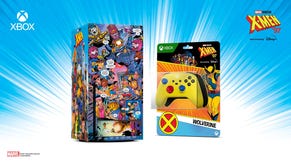Welcome to 2013: predicting this year's biggest trends
Just as the global New Year's Day hangover has worn off, 2013 promises to kick gaming into overdrive. VG247's Dave Cook looks ahead to what will be a scorching year for the industry.
You can usually label each year in gaming with a few watchwords or by name-dropping a handful of key releases. Take 2005 for example: it was the same year that brought Xbox 360 into our homes, and along with it, the concept of fully-integrated online functionality across the board.
2006 will be remembered by some as the year of motion, thanks to the launch of Nintendo Wii, while 2012 could arguably be dubbed the year of Freemium, Kickstarter, the DLC season pass, or even the year that The Walking Dead caught us all off guard and became highest-rated game of the period on Metacritic.
With these examples in mind, I thought it'd be neat to look forward at what 2013 has in store for gamers - not from a vanilla-flavoured 'year in preview' perspective - but to try and pre-empt some of the year's biggest trends and watchwords based on what we already know to see where all of this is heading.

'Services'
One thing that we'll start to see seeping through the cracks this year is the concept of gaming as a service, rather than a single-purchase piece of entertainment. I'm highly doubtful that we'll see such a service launch in the console sector this year, given that Microsoft's next Xbox looks to be a shoe-in for an E3 2013 reveal, and as our sources have told us that PS4 is being revealed before E3.
The age of the physical console unit isn't going away just yet - not this cycle anyway - but the wheels are definitely in motion, thanks to Sony's costly acquisition of GaiKai which could hint at Sony's software catalogue hitting the cloud in a streamed format at some point. The notion of a Spotify service for games is interesting, but we're likely still a while off from seeing the big console holders embracing it just yet.
However, Sony did launch a web store in December that collated its game, music and film content across a single unified marketplace, which is something you will be seeing a lot more of in 2013. One look at Xbox 360 and Wii U's apps - such as Netflix, Love Film and other tools point to the notion of games as multimedia hubs, rather than something you simply play games on.
This has been a long time coming of course, as consoles have been multimedia-enabled for some time, but 2013 will see the key platform holders push the concept in a big way. You've also got Steam's Big Picture Mode in the frame too, putting high-end PC gaming into the living room, giving a broader demographic of consumer reason to dip into gaming. Either way, the days of consoles being pure game systems is firmly at an end, and looks set to stay that way in 2013.

'Dynamic'
Speaking of next-gen, gamers everywhere are eager to see first-hand what new tricks Sony and Microsoft's boxes of wizardry are capable of. Back at E3 2012, both the Luminous Engine from Square-Enix, and Epic's Unreal Engine 4 were shown running in real-time, giving us a taste of what these new console and PC experiences will look like.
One watch-word that we often saw used in conjunction with both tech demos was 'dynamic', used to describe elements that react on the fly and often in great numbers, such as Unreal Engine 4's spark effects among others. We also caught a glimpse of what could be Valve's 'Source 2' engine, by way of a leaked swarm tech demo.
The ability to create so many individual elements that react to the user's interaction in real-time will have huge implications on what is possible in the next generation, and what's more exciting is that it's right around the corner - as in, actually happening this year - and we should all be excited about what these new engines are capable of.
Plus, we already know that Epic's Fortnite and Blacklight developer Zombie Studios' next game will use Unreal Engine 4 and are coming this year, so it will be interesting to see how they both turn out.

'Transmedia'
Ah this old thing again. Although word of movie adaptations are often met with many groaning and calls for Uwe Boll's head on a platter, it seems like the games industry is starting to get serious about the way its creations are treated on the silver screen. For one, Ubisoft has now set up its own movie label to oversee its IP's transition to film, presumably in a bid to see them handled with care and to retain greater creative control.
Ubisoft is busy on the whole adaptation front as a matter of fact, with a Raving Rabbids kid's show to air this year on Nickelodeon, Michael Fassbender taking the lead in Sony Picture's treatment of Assassin's Creed, Tom Hardy donning Sam Fisher's sneaking suit in the New Regency adaptation of Splinter Cell and most recently, a film adaptation of Ghost Recon.
There's also this month's release of animated flick Mass Effect: Paragon Lost, a reboot of the Mortal Kombat movies and somewhere lingering in the back are the long-stalled World of Warcraft film, and movies based on Uncharted and Gears of War that will probably never see the light of day.
Transmedia is a popular notion already - the idea of spinning out a game brand across merch, toys, films, soundtrack discs, comics and other media - rather than simply release a game and call it a day. The truth is that transmedia sells a brand and helps grow a franchise, and we all know how much the console industry loves a god franchise don't we? Expect this notion to explode in 2013.

'Asynchronous'
2012 saw the word 'asynchronous' bandied around a lot thanks to the very special relationship between Nintendo's Wii U and its GamePad controller. Devices that talk to each other and function in tandem might seem like a fad, but you might want to get used to it because it's going to be a big industry watchword in 2013.
The Wii U may have failed to light up the pre-xmas charts in 2012, but in 2013 the idea of tablets as controllers is going to grow. You can already see the signs today, with Microsoft's SmartGlass crossing the bridge between Xbox 360 and tablets, Sony's 'PlayStation Certified' line of devices helping the brand branch out, and again, Valve's Big Picture Mode crossing the gap from PC monitor to TV.
Even something as simple as using your iPhone as an Apple TV controller is a prime example of where the industry is heading in 2013. Let's not forget that several patents for asynchronous wearable computing and Xbox 720 tablet controller specs have been unearthed in conjunction with next-gen formats or emergent tech.
Not only does the notion of asynchronous play get a console manufacturer's brand on third-party devices, it ensures that no matter what you're doing on that external device, you're doing it on software designed by the company. Just look at what Microsoft is doing with its Windows 8 and Metro devices - covering all bases from PC to mobile and tablet.
If you're not a fan of what Wii U proposes with its tablet controller then you might be out of luck, because that kind of asynchronous play is going to be a big deal in 2013. The controller is the last part of a console's make-up that needs a serious reboot before the industry can potentially call time on physical consoles. We're certainly getting to that point now.

'Indie'
To be fair, the term 'indie' has been popular in the console domain since Braid launched in 2008, as it was the game that proved the big console market could be a suitable home for the untested new guy. Granted, that dream hasn't rung true for everyone, but if PS4 and Xbox 720 are to compete with the indie PC market dominated by Steam, GOG and other providers, it really needs to become more accommodating to indie devs.
In 2012 we heard testimony from Prison Architect developer Introversion that Xbox Live proved to be a money sink that saw very little in the way of returns for the developer, while some developers and gamers cry foul at how poorly Xbox Live's indie selection is signposted.
As more developers turn to services like Kickstarter, and indeed follow Notch's paid alpha model, there is a danger that Sony and Microsoft could start losing out on some of the big PC titles in 2013. That's not to say both PSN and Xbox Live don't have their fair share of stellar indie hits - because they absolutely do - it's just still a costly place to publish compared to outlets like Steam. It simply has to change.
Consoles aside, I just mentioned Kickstarter which will, of course, continue to prove a popular platform for developers to follow their dreams, even if the UK equivalent has seen several projects creak along at a slow pace. Will the bubble burst in 2013? Probably not, but it would be nice to see more finished projects releasing to see, tangibly, where our money has gone. Pat wrote a cracking piece on the demise of the Kickstarter gold rush here. Check it out for more on the matter.

'Quitting'
No, I'm not quitting VG247 so you'll have to put up with me for much, much longer I'm afraid. I'm talking of course about the number of developers quitting their positions at the industry's biggest studios and setting up shop on their own. Peter Molyneux was one of the first high profile departures from the triple-a fold - leaving Microsoft and Lionhead Studios to found Project Godus studio 22 Cans.
Cliff Bleszinski fled Epic Games to do 'something' - which may or may not be published or developed by Ubisoft - and may or may not be codenamed 'Silverstreak'. Nah, it totally is, and we have no idea what it's about, but 2013 could be the year we see what he's up to.
Bioware co-founders Greg Zeschuk and Ray Muzyka also fled the coop in 2012, we saw Keiji Inafune flee Capcom to oversee Soul Sacrifice, and Infinity Ward's Rob Bowling set up Robotoki, which is now working on a game called Human Element, due to release in 2015.
Why mention all of this? It's because we will likely see this trend continue in 2013. Truth be told, we can't go a quarter without some big studio posting a financial loss, or worse a closure announcement. Something is rotten in the triple-a sector, production costs are spiralling while the indie, small-to-mid size teams are prospering thanks to having more routes to market than ever before.
Moving into this space makes perfect financial sense if you have an idea and cash to back it, not to mention giving creators more room to, well, actually be creative. Kickstarter, paid alphas, App Store, Google Play, PSN, Steam, Xbox Live, WiiWare, 3DS eShop. These are all easier, more flexible routes to market that tired, quashed industry veterans are embracing. Don't be surprised if a few more big name developers jump ship in 2013.
That's all we have time for folks, but what do you think of the above watchwords, and what terms, concepts or ideas would you throw into the mix? Let us know below.









